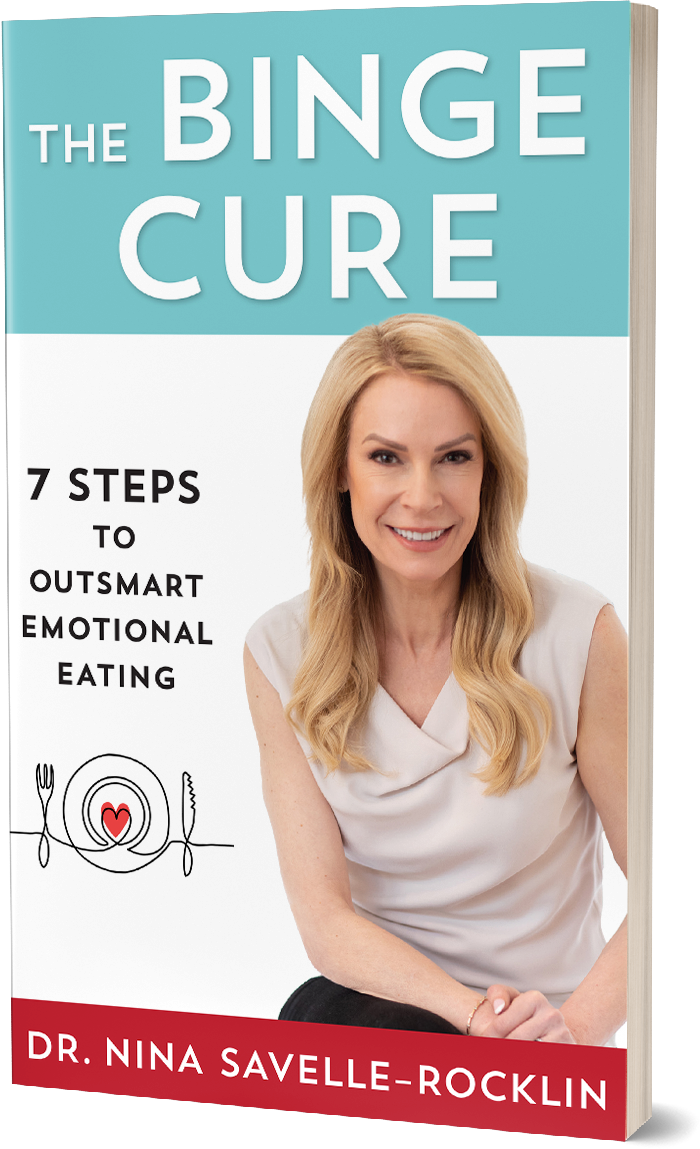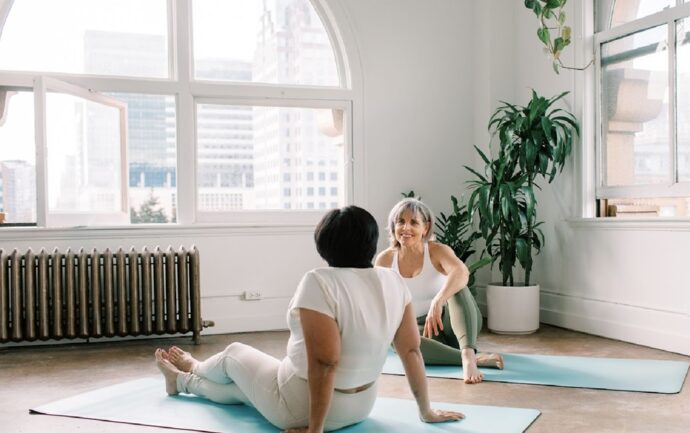Dr. Nina Savelle-Rocklin
How to Build Confidence: 6 Proven Strategies

In today’s society, the pressure to conform to certain beauty standards and success can be overwhelming. We are constantly bombarded with messages that suggest our worth is tied to our appearance, weight, or achievements. As a result, many of us struggle with feelings of inadequacy and low self-esteem, believing that we are not good enough as we are.
We may turn to diets or the pursuit of external validation in an attempt to boost our confidence, only to find that these solutions are temporary and ultimately unfulfilling.
True confidence doesn’t come from changing our bodies or reaching certain professional or personal milestones. It comes from within, from a deep-seated belief in our own worth and value.
In this article, I explore the concept of inner confidence and how it differs from the fleeting self-esteem that comes from meeting societal expectations. I also share six practical strategies on how to build confidence that lasts.
Once a month on my weekly podcast, I answer questions from listeners. Here are some of them:
- How can I build self-confidence when I feel so ashamed of my eating habits?
- What can I do to feel better about myself?
- How can I separate my self-worth from my weight?
- I feel stuck. I don’t have the confidence to do new things until I lose weight.
Table of Contents
- Why Weight Loss Doesn’t Equal Confidence
- Where did you learn you weren’t good enough?
- Practical Strategies on How To Build Confidence
- Frequently Asked Questions on the impact of Emotions on Eating Habits
Why Weight Loss Doesn’t Equal Confidence
It’s a pervasive message, isn’t it? You scroll through social media or flip through a magazine, and the message is clear: weight loss equates to happiness, confidence, and a better life.
Yet, this isn’t the case. Losing weight might change your appearance, but true confidence doesn’t come from the number on the scale. So, where does real, sustainable confidence come from?
Confidence, especially the kind that supports us through life’s ups and downs, is cultivated through the way we treat ourselves, the kindness we extend to our own struggles, and the patience we offer in our journey. It comes from self-compassion, not self-criticism.
Think about it: Have you ever achieved a goal only to feel a fleeting sense of accomplishment before moving on to the next thing? This chase for external validation can leave us feeling depleted and even more self-critical.
Real confidence isn’t about meeting arbitrary societal standards; it’s about understanding and embracing who you are, as you are, with all your unique qualities and imperfections.
Research suggests that confidence is crucial to both mental and physical health. When you build your confidence from within, you’re setting a foundation that supports all areas of your life.
You become more resilient, better able to handle stress, and more likely to pursue opportunities that align with your true self. It’s about nurturing a deep-seated belief in your worth, independent of your appearance or external achievements.
So, rather than fixating on numbers on a scale or the reflection in the mirror, let’s cultivate a sense of curiosity about what makes you feel truly alive, valued, and connected.
Where did you learn you weren’t good enough?
From a young age, many of us are bombarded with societal standards and expectations that shape our self-perception. Whether through media, family, or friends, we receive subtle and overt messages about what it means to be “good enough”.
These messages can manifest in various forms, such as comparisons to others, criticism, or unrealistic ideals of beauty and success.
1. School
Academic performance and social dynamics can play a significant role in shaping our self-worth. Not fitting in with certain social groups can lead to feelings of inadequacy. These experiences can create a narrative that we are not smart or likable enough, further eroding our self-confidence.
2. The Diet Industry
The $60 billion diet industry perpetuates the myth that physical appearance is linked to self-worth. Advertisements and social media often glorify certain body types, leading us to believe we must conform to these standards to be accepted and valued. This can cause a constant cycle of dieting and self-criticism, reinforcing the belief that we’re not good enough as we are.
3. Family Dynamics
Our upbringing also plays a crucial role in shaping our self-esteem. Parents or guardians who are overly critical or have high expectations can inadvertently instill a sense of inadequacy in their children. Even well-meaning comments about weight, appearance, or abilities can affect a child’s self-perception.
4. Rejection
Personal experiences of failure or rejection can significantly impact our sense of self-worth. Whether we don’t get a job we interview for, face a breakup, or experience social rejection, these events can lead to internalized beliefs about not being capable or deserving of success and happiness. Over time, these beliefs can become deeply ingrained, making it challenging to cultivate inner confidence.
5. Peer relationships
Our interactions during childhood and adolescence can also impact our beliefs about ourselves. Bullying, exclusion, or negative comparisons with friends can significantly damage self-esteem. These social experiences can reinforce the notion that we are not good enough, leading to a persistent internal narrative of self-doubt.
6. The workplace
Our jobs provide yet another environment where feelings of inadequacy can be cultivated. Performance reviews, competitive colleagues, and the pressure to meet professional milestones can contribute to a sense of not being good enough. This is especially true in cultures prioritizing productivity and success over well-being and personal growth.
7. Relationships
Personal relationships, including romantic partnerships, can also influence our self-perception. Experiencing rejection, criticism, or emotional neglect from partners can lead to feelings of unworthiness. These experiences can reinforce the belief that we need to change or improve ourselves to be loved and accepted.
8. Cultural and Societal Narratives
Messages from advertising, entertainment, and even well-meaning public health campaigns can perpetuate the idea that we need to look a certain way or achieve specific goals to be valued. These pervasive messages can deeply impact our self-esteem and confidence. Here is an example:
“The Eye of the Beholder” is a classic episode of The Twilight Zone. It originally aired on November 11, 1960, 64 years ago.
In the episode, a woman named Janet undergoes surgery to appear “normal.” Throughout the episode, her face is wrapped in bandages, and the doctors and nurses discussing her case have their faces in shadow, so we can’t see them.
In the end, Janet’s bandages are removed, revealing that she is actually a beautiful woman by our standards. And, the medical staff and others in the hospital are revealed to have grotesque, pig-like faces. In this society, Janet’s “beautiful” appearance is considered ugly and unacceptable.
Here are some lessons we can learn from that episode:
- Beauty is subjective: The episode challenges the idea that there is a universal standard of beauty. What is considered attractive in one society may be seen as ugly in another.
- Dangers of conformity: The episode highlights the dangers of a society that demands strict adherence to a particular set of norms. It shows how the pressure to conform can lead to a loss of individuality and diversity.
- Importance of self-acceptance: Janet Tyler’s struggle to conform to her society’s standards of beauty emphasizes the importance of accepting and loving oneself, regardless of others’ opinions.
- Prejudice and discrimination: The episode sheds light on how people who are different from the majority can face prejudice, discrimination, and ostracism.
- Appearance vs. character: The reveal at the end of the episode suggests that true beauty lies in one’s character and actions rather than physical appearance.
- Power of perspective: The twist ending demonstrates how our perceptions can be limited by our own experiences and societal norms. It encourages viewers to question their assumptions and consider alternative viewpoints.
- Societal critique: The episode serves as a critique of societies that prioritize superficial qualities over individual merit and humanity.
- Empathy and understanding: The episode encourages viewers to put themselves in the shoes of those who are considered “different” and to approach others with empathy and understanding.
Practical Strategies on How To Build Confidence
Confidence is an internal state that is cultivated through self-awareness and self-acceptance. One foundational step to feeling more confident is practicing self-compassion. This means treating yourself with the same kindness and understanding that you would offer to a close friend.
When you make a mistake or face a setback, instead of being overly critical, remind yourself that everyone experiences difficulties and that it’s okay to be imperfect. Here are six practical strategies for building confidence.
1. Challenge Negative Self Talk
Another key aspect of building inner confidence is to challenge negative self-talk. Our internal dialogue can significantly impact our self-esteem. When you think negatively about your abilities or appearance, pause and reframe those thoughts. Replace self-criticism with affirmations and positive statements that reflect your true worth and potential.
2. Set Realistic Goals
Setting realistic and achievable goals is another effective way to boost confidence. Break down larger objectives into smaller, manageable tasks and celebrate your progress. Achieving these smaller milestones provides a sense of accomplishment and reinforces your belief in your abilities.
3. Get Support
Surrounding yourself with supportive and positive people can greatly influence your confidence levels. Only have relationships that uplift and encourage you, rather than those that bring you down. Positive social interactions can help you feel valued and appreciated, boosting your self-esteem.
4. Do What You Love
Engaging in activities you enjoy and excel at can also enhance your confidence. Whether it’s a hobby, sport, or creative pursuit, doing something that makes you feel competent and fulfilled can provide a significant confidence boost. These activities remind you of your strengths and talents, reinforcing a positive self-image.
5. Exercise
While often associated with physical health, physical activity can also profoundly impact mental well-being and confidence. Regular exercise releases endorphins, which improve mood and reduce stress. Physical activity can help you feel more connected to your body and appreciate its capabilities.
6. Celebrate Yourself
Finally, it’s important to recognize and celebrate your unique qualities and achievements. Keep a journal where you regularly note down your successes, no matter how small they may seem. Reflecting on these positive experiences can help you build a more positive self-image and reinforce your inner confidence.
In conclusion, building true, sustainable confidence involves challenging the societal narratives and personal experiences that have led us to believe we’re not good enough, and instead, cultivating a deep sense of self-compassion and self-acceptance.
By reframing negative self-talk, setting realistic goals, surrounding ourselves with supportive people, engaging in fulfilling activities, and celebrating our unique qualities, we can gradually shift our self-perception and develop a more positive self-image.
Remember, confidence isn’t about meeting arbitrary external standards; it’s about embracing who you are, with all your strengths and imperfections, and believing in your inherent worth.
True confidence takes time to build, but with consistent effort and self-compassion, you can create a foundation of inner strength that will support you through all of life’s challenges and triumphs.
Frequently Asked Questions on the impact of Emotions on Eating Habits
In this Frequently Asked Questions section, I address common questions and concerns and provide insights on how to build confidence. Whether you’re struggling with self-esteem issues, seeking to separate your self-worth from societal standards, or looking for ways to boost your confidence, these answers are designed to guide and support you on your journey towards developing self-confidence.
1. How can I build self-confidence when I feel ashamed of my eating habits?
Building self-confidence starts with self-compassion and understanding that everyone has struggles. Recognize that your worth is not tied to your eating habits. Practice self-kindness and focus on your positive qualities. Surround yourself with supportive people and seek help from a professional if needed to address any underlying issues.
2. What can I do to feel better about myself?
To feel better about yourself, challenge negative self-talk and replace it with positive affirmations. Set realistic, achievable goals and celebrate your progress. Engage in activities you enjoy and excel at, and surround yourself with supportive and positive individuals who uplift you.
3. How can I separate my self-worth from my weight?
Understand that your self-worth is inherent and not dependent on your physical appearance. Focus on developing inner confidence through self-compassion, self-acceptance, and recognizing your unique strengths and qualities. Engage in activities that make you feel competent and fulfilled, and seek support from positive relationships.
4. I feel stuck. How can I gain the confidence to try new things before losing weight?
Start by setting small, realistic goals unrelated to your weight. Celebrate each achievement to build momentum and confidence. Challenge negative thoughts and practice self-compassion. Remember that trying new things can be an empowering experience that boosts your self-esteem regardless of the number on the scale.
5. Why doesn’t weight loss equate to confidence?
Weight loss alone doesn’t lead to lasting confidence because true confidence comes from within. It is cultivated through self-compassion, self-acceptance, and recognizing your intrinsic worth. While weight loss might provide temporary satisfaction, lasting confidence is built on a foundation of positive self-perception and treating yourself with kindness and respect.
The Author

Dr. Nina Savelle-Rocklin is a renowned author and podcast host and one of the nation’s leading psychoanalysts known for the psychology of eating. Her signature message of, “It’s not what you’re eating, it’s what’s eating ‘at’ you” has resonated with hundreds of thousands of listeners from around the globe in 40 countries. As founder of The Binge Cure Method, she guides emotional eaters to create lasting food freedom so they can take back control of their lives and feel good in their bodies.
Related Blogs


















